
Famitsu, formerly Famicom Tsūshin, is a line of Japanese video game magazines published by Kadokawa Game Linkage, a subsidiary of Kadokawa. Famitsu is published in both weekly and monthly formats as well as in the form of special topical issues devoted to only one console, video game company, or other theme. Shūkan Famitsū, the original Famitsu publication, is considered the most widely read and respected video game news magazine in Japan. From October 28, 2011, the company began releasing the digital version of the magazine exclusively on BookWalker weekly.

Demon Gaze is a dungeon crawl video game developed by Kadokawa Games and Experience Inc. for the PlayStation Vita. Released in Japan on January 24, 2013, it was published in North America and Europe by NIS America in April 2014. The game takes place thousands of years after the events of its predecessor, Students of the Round, which was created by the same developer.
Danganronpa is a Japanese video game franchise created by Kazutaka Kodaka and developed and owned by Spike Chunsoft. The series primarily surrounds various groups of apparent high-school students who are forced into murdering each other by a robotic teddy bear named Monokuma. Gameplay features a mix of adventure, visual novel, detective and dating simulator elements. The first game, Danganronpa: Trigger Happy Havoc, was released for the PlayStation Portable in 2010.

Science Adventure, commonly shortened to SciADV, is a multimedia series consisting of interconnected science fiction stories created by Mages, initially in collaboration with Nitroplus. The main entries mostly take the form of visual novel video games.

Dragon Quest Builders is a 2016 sandbox action role-playing game developed and published by Square Enix for the PlayStation 3, PlayStation 4, PlayStation Vita, Android iOS, and Microsoft Windows and published by Nintendo for Nintendo Switch.
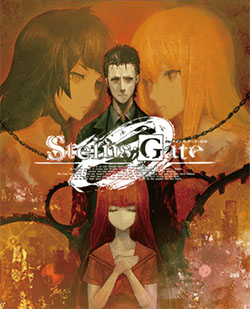
Steins;Gate 0 is a 2015 visual novel video game developed by 5pb. It is part of the Science Adventure series, and is set in the period of the 2009 game Steins;Gate. It was released by 5pb. in Japan for the PlayStation 3, PlayStation 4 and PlayStation Vita in December 2015, Microsoft Windows in August 2016, Xbox One in February 2017, and Nintendo Switch in March 2019.

The Caligula Effect is a 2016 role-playing video game developed by Aquria. It was released for the PlayStation Vita in Japan in June 2016, and by Atlus USA in North America and Europe in May 2017. A remake of the game, The Caligula Effect: Overdose, was released for the PlayStation 4 in Japan in May 2018, and worldwide by NIS America in March 2019 for the PlayStation 4, Nintendo Switch, and Windows. An anime adaptation of the same name premiered in April 2018.

Chaos;Child is a 2014 visual novel video game developed by Mages. It is the fourth main entry in the Science Adventure series and a thematic sequel to Chaos;Head Noah. It was initially released for Xbox One, and later for PlayStation 3, PlayStation 4, PlayStation Vita, Microsoft Windows, iOS, Android, and Nintendo Switch. An English localization was released for the PlayStation 4 and PlayStation Vita by PQube in 2017, and for Windows and Switch by Spike Chunsoft in 2019.
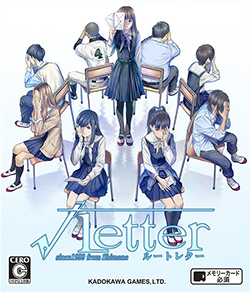
Root Letter, stylized as √Letter, is a 2016 visual novel adventure video game developed and published by Kadokawa Games for PlayStation 4, PlayStation Vita, Microsoft Windows, Android, and iOS. It is the first entry in the Kadokawa Game Mystery brand, and was followed by Root Film in 2020.
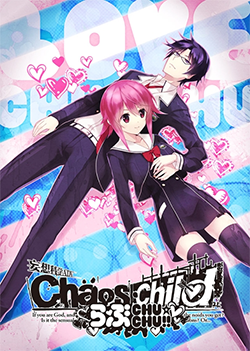
Chaos;Child Love Chu Chu!! is a 2017 visual novel video game developed and published by Mages for the PlayStation 4 and PlayStation Vita on March 30, 2017, in Japan. It is a fan disc for the 2014 game Chaos;Child, and part of the larger Science Adventure series. The story, which is affected by player choices, is set in Shibuya, Tokyo after the events of Chaos;Child, and follows Takuru Miyashiro, who ignores the "Return of the New Generation Madness" events, instead choosing to spend time with women.

Steins;Gate Elite is a science fiction visual novel and interactive movie video game, part of the Science Adventure series. It was developed by 5pb. for PlayStation 4, PlayStation Vita, Nintendo Switch, Microsoft Windows and iOS, and was released in September 2018 in Japan and in February 2019 internationally. It is an updated, fully animated remake of the 2009 game Steins;Gate, using footage from the anime adaptation of the original game along with newly produced animation by White Fox.

Spirit Hunter: Death Mark is a horror visual novel adventure game developed and published by Experience, and is the first entry in the Spirit Hunter series. It was originally released in June 2017 for PlayStation Vita in Japan, and was later ported to PlayStation 4, Nintendo Switch and Xbox One. The game was published worldwide by Aksys Games in October 2018 for the same platforms except Xbox One, and was additionally released for Microsoft Windows in both English and Japanese in April 2019. It is followed by two sequels: 2018's Spirit Hunter: NG, and Spirit Hunter: Death Mark II.

Spirit Hunter: Death Mark II is a horror visual novel adventure game developed and published by Experience. It is the third entry in the Spirit Hunter series, following 2017's Spirit Hunter: Death Mark and 2018's Spirit Hunter: NG. The game was released for Nintendo Switch and PlayStation 4 on December 1, 2022 in Japan, and was released by Aksys Games for Nintendo Switch, PlayStation 5 and Windows on February 15, 2024 worldwide.

Captain Tsubasa: Rise of New Champions is an association football sports video game developed by Tamsoft and published by Bandai Namco Entertainment for Microsoft Windows, PlayStation 4 and Nintendo Switch in August 2020. It is based on the 2018 anime series Captain Tsubasa.
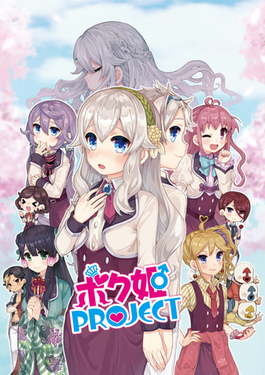
Bokuhime Project is a mystery adventure video game developed by Wizard Soft. It was published by Nippon Ichi Software in Japan for the Nintendo Switch and PlayStation 4 in 2020, and for Microsoft Windows in 2021. The player takes the role of a young man who infiltrates a school for refined young ladies by enrolling as a female student to investigate an incident involving his sister. As part of their investigation, the player aims to get a seat in an influential organization at the school, and thereby needs to improve their character statistics to raise their character's cuteness, overcoming the other candidates.

EVE Burst Error is a 1995 visual novel adventure game developed by C's Ware, originally released as an erotic game. It was written and produced by Hiroyuki Kanno, with chiptune video game music composed by Ryu Umemoto. It is the first game in the EVE series of visual novels. The game follows a government agent and a private investigator investigating a series of bizarre cases which are later connected to one another.

ESP Ra.De. is a 1998 vertical-scrolling bullet hell arcade game originally developed by Cave and co-published by Atlus and Nihon System in Japan. Set in the year 2018, players assume the role from one of the three ESPers to overthrow Lady Garra and her Yaska syndicate from taking over Tokyo.
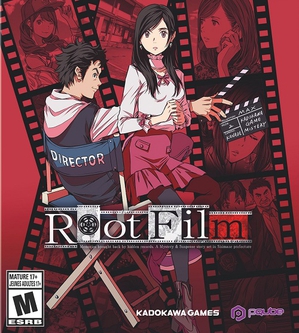
Root Film is an adventure visual novel video game by Kadokawa Games. The game is a spiritual successor to 2016's Root Letter visual novel and the second entry in the Kadokawa Mystery Games series. The game released on the Nintendo Switch and PlayStation 4 in Japan in July 2020, and on March 19, 2021 in North America and Europe.

Record of Lodoss War: Deedlit in Wonder Labyrinth is a 2021 action role-playing video game developed by Team Ladybug and co-published by Playism and Why so serious? for Microsoft Windows. Versions for Nintendo Switch, PlayStation 4, PlayStation 5, Xbox One, and Xbox Series X and Series S were also released. It is based on Ryo Mizuno's Record of Lodoss War series, taking place before the events of The Crown of the Covenant. Controlling the high elf Deedlit, who finds herself in a strange interconnected labyrinth filled with her past foes and companions, the game focuses on exploration and searching for items and power-ups in the vein of Castlevania: Symphony of the Night, fighting bosses and minibosses. During gameplay, the player also locates two elemental spirits and swaps between each one.

Gnosia is a 2019 visual novel social deduction role-playing game developed by Petit Depotto. It was originally released in June 2019 for the PlayStation Vita, and was ported to the Nintendo Switch in December 2020, with a Windows version released in January 2022. It also released for PlayStation 4, PlayStation 5, Xbox One and Xbox Series X/S in December 2023. An anime television series adaptation is set to premiere in 2025.


















